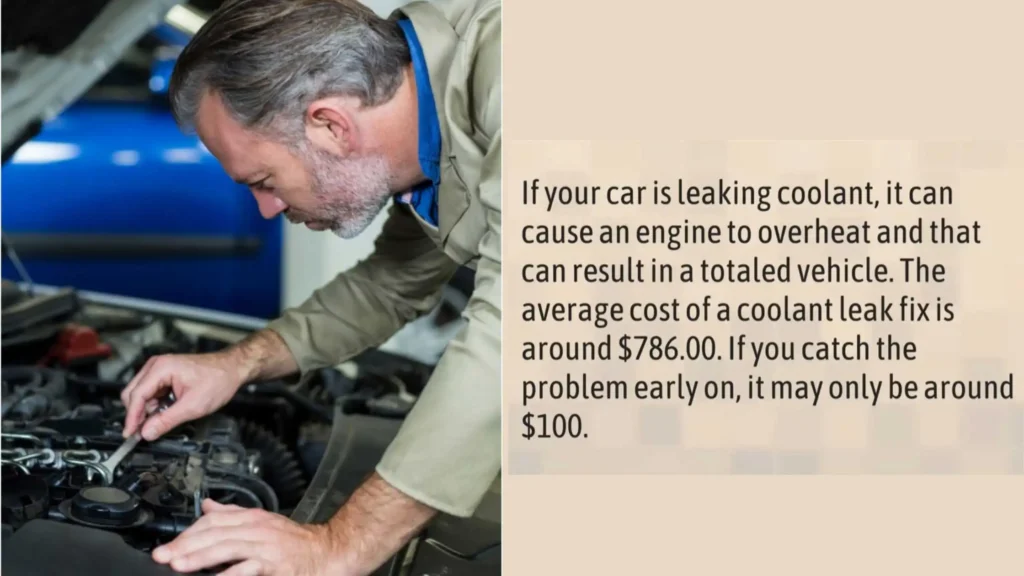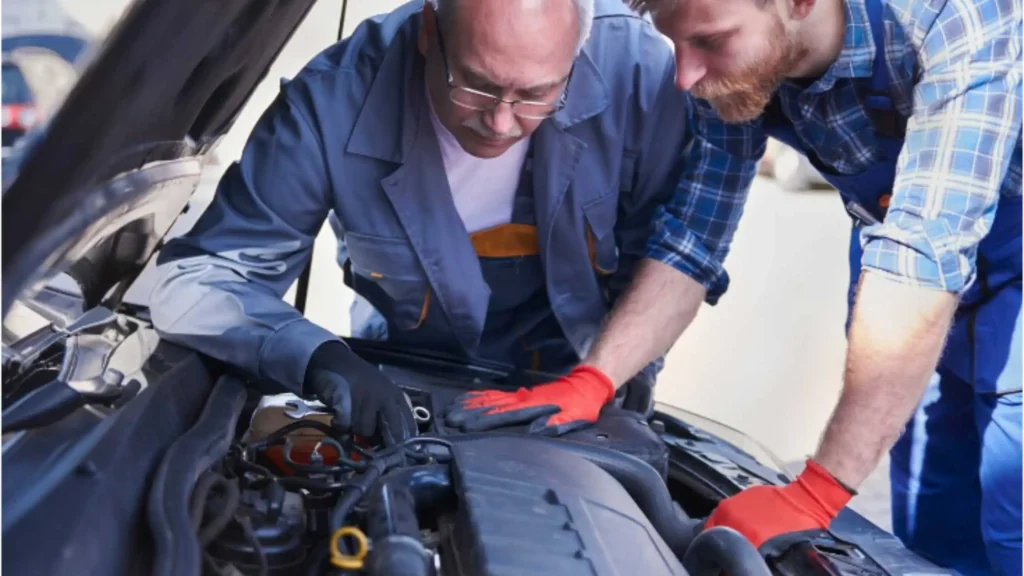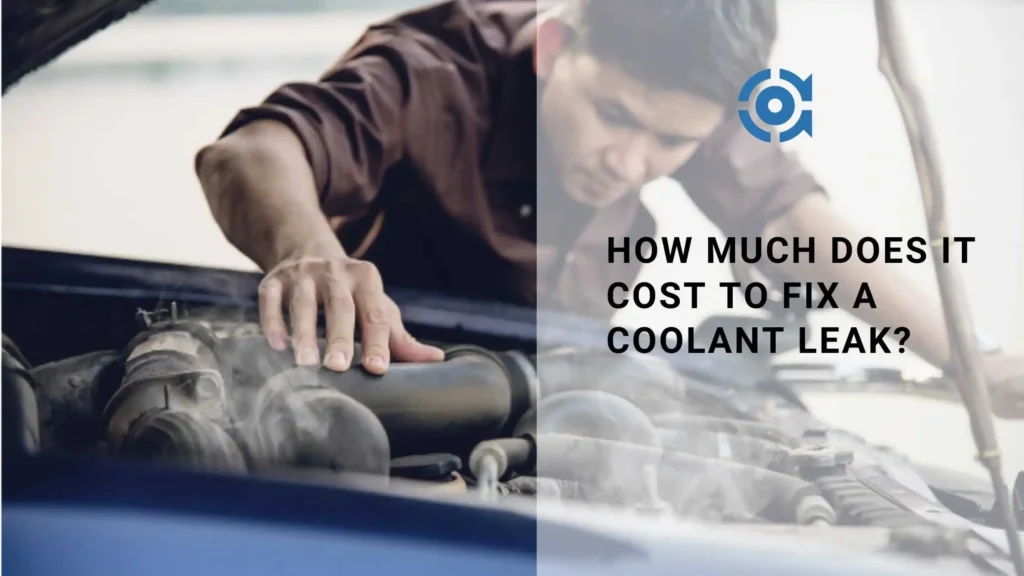The cost to fix a coolant leak typically ranges (U.S.) from about $150 for minor hose/clamp fixes to $2,000+ for major repairs. Radiator or water-pump related leaks often total $800–$1,400 installed, while head-gasket-related leaks can exceed $1,600.
Repairing a coolant leak is crucial for maintaining your vehicle’s performance and preventing engine damage. Coolant, also known as antifreeze, is essential for regulating your engine’s temperature. A leak can lead to overheating, which may cause severe damage to your engine and result in more expensive repairs.
Quick detection and repair are key to minimizing costs and preserving the longevity of your car. The cost includes labor, which depends on the time needed for the repair, and parts, which can vary from a simple hose replacement to a more complex issue like a radiator or water pump replacement.
It’s important to address coolant leaks promptly to avoid the risk of engine failure and to ensure your vehicle operates safely and efficiently.
Introduction To Coolant Leak Issues

Coolant leaks can spell trouble for your vehicle. They lead to overheating and engine damage. Understanding the role of coolant and the symptoms of a leak is vital. This guide helps you spot and fix coolant leaks early.
The Role Of Coolant In Your Vehicle
Coolant, also known as antifreeze, keeps your engine at the right temperature. It prevents freezing in winter and boiling in summer. A well-functioning coolant system is key to a healthy vehicle.
- Protects engine parts from corrosion
- Helps maintain engine temperature
- Prevents freezing and boiling of the engine
Symptoms Of A Coolant Leak
Spotting a coolant leak early can save you money and prevent damage. Here are signs to look for:
- Puddles under your car – Look for bright green, orange, or pink fluid.
- Overheating engine – Your dashboard may show a high temperature.
- Low coolant warning – A light on your dashboard might turn on.
- Steam from under the hood – Indicates coolant is leaking and hitting hot engine parts.
Identifying The Source Of The Leak
Before diving into the costs of fixing a coolant leak, it’s crucial to pinpoint where the problem lies. A correct diagnosis can save time and money. Let’s explore the typical leak locations and how to spot them with some DIY tips.
Common Leak Locations
- Radiator: Check for puddles or corrosion.
- Hoses: Look for cracks or splits.
- Water Pump: Search for drips or a faulty seal.
- Head Gasket: White smoke from the exhaust can indicate a leak.
- Heater Core: Wetness inside the car suggests a leak.
Diy Inspection Tips
Visually inspect: Look under your car for colored liquid.
Check coolant level: A low level might reveal a leak.
Pressure test: Use a tester to find weak points.
Use dye: A colored dye can help trace the leak’s path.
Consult a manual: Vehicle guides offer specific inspection steps.
Factors Affecting Repair Costs

Understanding Factors Affecting Repair Costs is crucial in fixing a coolant leak. Various elements play a role. These include the leak’s severity, your vehicle’s make and model, and the replacement parts needed. Let’s dive deeper into each factor.
Severity Of The Leak
The cost can vary greatly depending on how bad the leak is. Small leaks might only need a simple fix. This could be as easy as tightening a hose clamp. Larger leaks might require more work, like replacing parts. This makes the repair more expensive.
Vehicle Make And Model
Different cars have different costs. Luxury or imported cars often cost more to repair. This is because their parts are pricier and less common. The table below shows very general ranges; actual totals depend on the specific repair and vehicle (see examples in the cost sections).
| Car Type | Average Repair Cost |
|---|---|
| Economy | $150 – $600 |
| Luxury | $600 – $1,600 |
| Imported | $700 – $2,000+ |
Replacement Parts
The type of parts needed can affect the cost too. Some cars need specific brand parts. These can be more expensive. Here’s a list of common parts that might need replacing and their cost range:
- Radiator Hose (part only): $15 – $50
- Water Pump (part only): $60 – $250+ (installed totals often $800+ depending on vehicle)
- Radiator (part only): $200 – $400+ (installed totals commonly ~$940–$1,730+ depending on vehicle)
Using high-quality replacement parts can prevent future leaks. This saves money in the long run.
Diy Repair Solutions
Fixing a coolant leak yourself can save money. Let’s dive into DIY repair solutions.
Tools And Materials Needed
- Coolant
- Sealant (specific for coolant systems)
- Wrench set
- Screwdrivers (flathead and Phillips)
- Rags for cleaning
- Protective gloves and glasses
Step-by-step Repair Guide
- Identify the leak. Look for wet spots or pools under the car.
- Prepare your car. Make sure it’s cool and on a flat surface.
- Drain old coolant. Use a container to catch it.
- Remove affected parts. Use your wrench and screwdrivers.
- Clean the area. Make sure it’s dry before proceeding.
- Apply sealant. Follow the product’s instructions carefully.
- Replace parts and refill coolant. Put everything back and fill up.
- Check for leaks. Start your car and look for any new leaks.
These steps can help fix a coolant leak at home. Remember, safety first. Wear gloves and glasses. Follow instructions on products. This guide can save time and money. Good luck with your DIY repair!
Professional Repair Services
When your car shows signs of a coolant leak, seeking professional repair services is essential. These experts provide accurate diagnoses and reliable fixes. Quality repairs ensure your vehicle runs smoothly and safely.

Choosing The Right Mechanic
Select a reputable mechanic with experience in cooling system repairs. Check online reviews and ask friends for referrals. Ensure the mechanic is certified and offers a warranty on their work.
What To Expect At The Garage
- Diagnosis: Technicians will inspect your vehicle to find the leak source.
- Estimate: You’ll receive a cost breakdown for parts and labor.
- Repair: Mechanics will fix the leak, replace any damaged parts, and refill the coolant.
- Testing: After the repair, they will test your car to ensure no leaks remain.
| Service | Cost Range |
|---|---|
| Diagnosis | $60 – $88 |
| Parts | $20 – $400+ (part-only examples; see totals below) |
| Labor | Varies by shop/region; totals below include parts & labor |
Repair costs vary based on the leak’s severity and your car’s model. Mechanics use specialized tools and techniques to fix leaks effectively. Trust professionals for a long-lasting solution.
Cost Breakdown Of Coolant Leak Repairs
Understanding the Cost Breakdown of Coolant Leak Repairs is crucial. A coolant leak can lead to major engine problems. Knowing the potential costs helps in making informed decisions. This section breaks down the expenses involved.
Labor Costs
Labor is typically quoted as a flat-rate job and varies by market and vehicle. Focus on the total installed price for your specific repair (examples below) rather than an hourly figure.
Parts And Supplies
The cost of parts and supplies can also differ. Here’s a basic list:
- Coolant Hose: $15 – $50 (part only)
- Radiator: often a few hundred dollars (part only); installed totals commonly ~$940–$1,730+ depending on vehicle
- Water Pump: $60 – $250+ (part only); installed totals often ~$630–$1,320+ depending on vehicle
- Coolant: ~$12 – $25 per gallon (50/50 premix), brand/type dependent
Prices depend on the car’s make and quality of parts.
Additional Services
Sometimes, fixing a coolant leak involves extra services:
- Diagnostic Tests: ~$60 – $88 to pinpoint the leak.
- System Flush: Typically ~$131 – $209.
- Thermostat Replacement: Often ~$563 – $653 installed (parts and labor).
These services ensure your car runs smoothly after the repair.
Total costs can range from ~$150 to $2,000+ , based on the damage’s extent and your car’s model. Early detection and repair can save money and prevent bigger issues.
Preventing Future Coolant Leaks
Preventing Future Coolant Leaks is essential for your vehicle’s health and your wallet. Addressing this issue early can save you from costly repairs. Ensuring your car remains leak-free involves regular checks and timely action. Let’s explore the best practices to keep your cooling system in top shape.
Regular Maintenance Tips
Stick to a maintenance schedule. Your car’s manual lists vital service intervals. Follow it closely.
- Check coolant levels during oil changes.
- Inspect hoses and clamps for wear and tear.
- Replace coolant per the owner’s manual; many modern vehicles with extended-life coolant specify up to ~5 years/100,000 miles before the first change.
- Use the correct coolant type for your vehicle to avoid chemical damage.
Early Detection Strategies
Spotting issues early can prevent major repairs. Stay alert to signs of trouble.
- Monitor temperature gauges. A rising gauge indicates potential leaks.
- Look for puddles. Green or orange liquid under your car is a warning.
- Smell the air. A sweet scent could mean coolant is leaking.
- Listen for hissing. This sound often comes from a leaking radiator.
Take action at the first sign of a leak. Early repair prevents engine damage.
Frequently Asked Questions of How Much Does It Cost to Fix a Coolant Leak?
Is A Coolant Leak Expensive To Fix?
The cost to fix a coolant leak can vary, ranging from relatively inexpensive for simple issues to more costly for complex repairs.
Can You Drive A Car With A Coolant Leak?
Driving with a coolant leak is risky and can lead to engine overheating or severe damage. It’s essential to address the leak promptly before driving.
How Long Does A Coolant Leak Take To Fix?
The time to fix a coolant leak varies, typically ranging from 1 to 2 hours, depending on the severity and location of the leak.
Is A Coolant Leak Easy To Fix?
A coolant leak’s ease of repair varies by the leak’s location and severity. Simple hose leaks can be quick fixes, while issues like a cracked engine block are more complex. Always consult a professional mechanic for accurate diagnosis and repair.
Conclusion
Understanding the cost to repair a coolant leak is crucial for maintaining your vehicle’s health. Prices can vary widely, based on factors such as labor, parts, and the severity of the issue. Always consult a trusted mechanic to ensure a precise diagnosis and fair pricing.
Remember, timely repairs save money and extend your car’s life.


